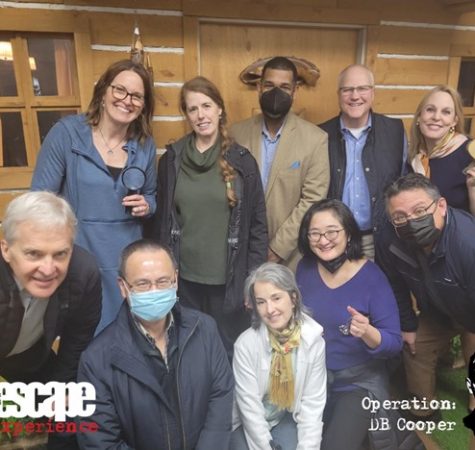Recently, a group of Murdock Trust program directors faced a challenge they’ve never seen before. Instead of reviewing proposals, they were tracking down an infamous criminal in a remote cabin in the woods—at an escape room in downtown Vancouver, WA, that is. It turns out the strategic thinking and critical analysis of evaluating grants are good preparation for the challenges they faced there. (Perhaps they may open a Murdock Trust detective agency in retirement!) But it’s just as true that the experience of the escape room is excellent preparation for the day-to-day tasks this group engages in as a work team. Intentional team building experiences are among the most effective ways to grow a strong team. And a strong team is one of the greatest indicators of a successful organization.
Effective Teams #

No team is exactly alike, but effective teams share important qualities. Strong, thoughtfully developed teams get more work done because their roles are defined and their goals clarified. Team members are willing to be vulnerable with one another and take risks. This increases innovation, problem-solving, and the chance of success. Each team member’s talents and interests are put to their best use, making workers more motivated and successful in their day-to-day tasks. Perhaps most importantly, strong teams are happy teams who are motivated to work together and reach goals.
Working with nonprofit organizations for nearly fifty years, we have observed countless teams in action. While the sizes, scopes, missions, and projects of these organizations vary greatly, one thing is remarkably consistent across them all: thoughtfully developed teams are better able to fulfill their mission and serve their communities. We’ve heard this from our grantees, too. Investing in team building is often one of the best investments they make in their mission, and ultimately, the communities they serve.
The Importance of Team Building #
Here are some tangible ways investing in teambuilding can strengthen your nonprofit organization:
- Team building activities can enhance communication within your organization. One study found that team building can improve organizational ability to clarify roles and set goals. This can lead to decreased confusion and less time spent on irrelevant tasks. In fact, this leads to more effective outcomes especially for teams that need to constantly adapt – which is just about every nonprofit organization these days!
- Team building activities can help build trust, which improves performance. It goes without saying that trust is important for a happy, healthy team. But one meta-analysis of evidence from 112 independent studies across 7,763 teams also found significant evidence that trust improves performance. When teammates trust one another, they’re more vulnerable, creative, and communicative.
- Team building makes your employees more invested in their work. One survey of 200,000 employees across 500+ organizations found that peers and team camaraderie are the #1 reason employees go the extra mile at their job. What does this mean for your organization? Invest in team building, and you’ll likely see greater investment from your team. Plus, employees in the nonprofit sector are often even more motivated by the people they work with and serve, so investing in nonprofit team building may yield even greater benefits.
- Team building activities create a foundation for future success. There is a difference between team training, which is typically skill-focused training done in a work context, and team building, which targets skill-based competencies and usually takes place outside of a work context. Both are valuable, but team building tends to yield longer-term results, such as better communication and trust, which can be applied for years to come across a variety of projects. Team building now pays dividends in the future.
Where to Begin #
So where should your organization begin? Think about your employees, what they enjoy, and what platforms might engage them. Do they have shared interests? Try a group cooking class or a Zumba class. Organize a scavenger hunt around your city. Or if you’re up to the challenge, try to match our program directors’ success at an escape room near you.
At the end of the day, team building is important not just because it makes your team more productive, but because it reinforces relationships with the people who show up to work together every day. After all, the most important asset in any organization is its people. By investing in yours, you’re investing in their well-being and the health of your organization, which enriches the communities you serve and in doing so, our entire region.
The post The Importance of Team Building appeared first on M. J. Murdock Charitable Trust.






